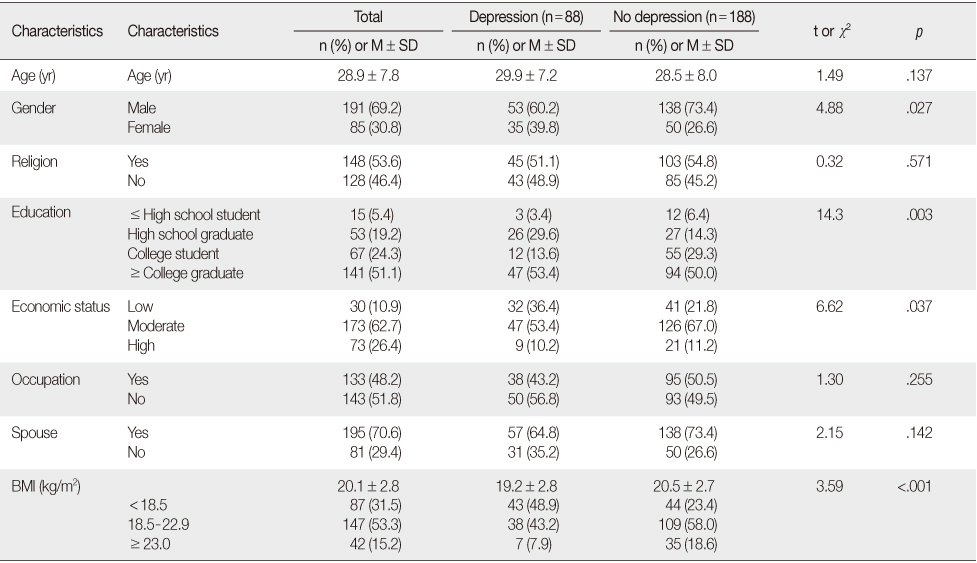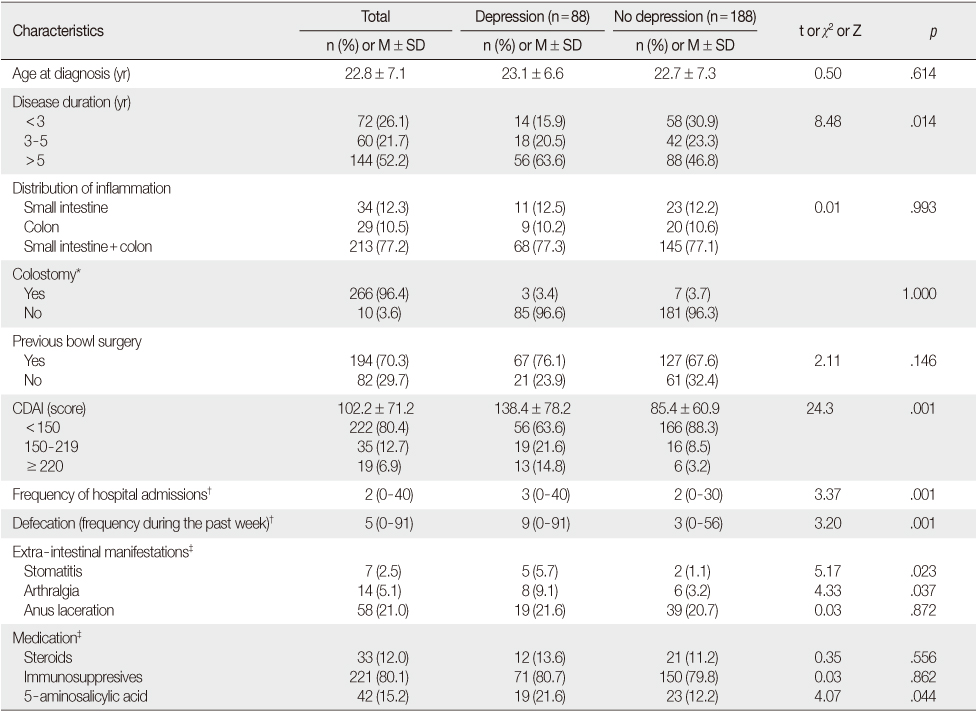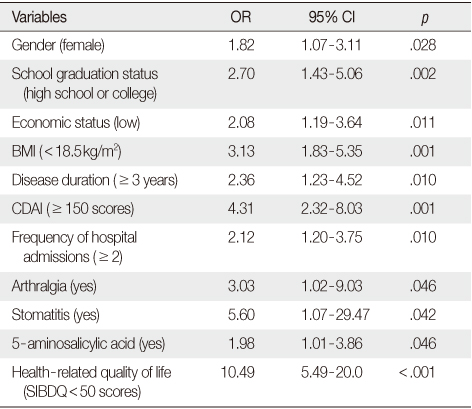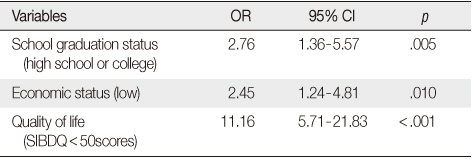Articles
- Page Path
- HOME > J Korean Acad Nurs > Volume 42(2); 2012 > Article
-
Original Article
- Depression and Risk Factors in Patients with Crohn's Disease
- Ok-Hee Cho, Yang-Sook Yoo, Suk-Kyun Yang
-
Journal of Korean Academy of Nursing 2012;42(2):207-216.
DOI: https://doi.org/10.4040/jkan.2012.42.2.207
Published online: April 30, 2012
1Full-time Lecturer, College of Nursing, Jeju National University, Jeju, Korea.
2Professor, College of Nursing, The Catholic University of Korea, Seoul, Korea.
3Professor, Department of Gastroenterology, University of Ulsan College of Medicine, Asan Medical Center, Seoul, Korea.
- Address reprint requests to: Yoo, Yang-Sook. College of Nursing, Jeju National University, 505 Banpo-dong, Seocho-gu, Seoul 137-701, Korea. Tel: +82-2-2258-7411, Fax: +82-2-2258-7772, ysyoo@catholic.ac.kr
© 2012 Korean Society of Nursing Science
Abstract
-
Purpose
- This study was conducted to determine the risk factors among patients with depression with Crohn's disease.
-
Methods
- Data were collected by questionnaire from 276 patients who were diagnosed with Crohn's disease at a tertiary hospital located in Seoul. Measurements included patients' demographic characteristics, clinical characteristics, depression level, and health-related quality of life. Data were analyzed using t-test, χ2-test, Wilcoxon rank sum test, and logistic regression analyses.
-
Results
- The incidence rate of depression (BDI-II≥14scores) was 31.9% (n=88). Univariate analysis revealed that being a woman, school graduation status, economic status (low), BMI(<18.5Kg/m2), disease duration (≥3 years), CDAI (≥150 scores), frequency of hospital admission (≥2), extra-intestinal manifestation (arthralgia, stomatitis), administration of 5-aminosalicylic acid, and disease related quality of life (SIBDQ<50 scores) were associated with depression. Multivariate analysis revealed that economic status (low), school graduation status, and quality of life (SIBDQ<50 scores) were more likely to report high level of depression.
-
Conclusion
- Future research should consider managing depression as an essential component of comprehensive care for patients with Crohn's disease. In addition, further research is needed to develop strategies to better improve quality of life among patients with Crohn's disease who are depressed.
The authors wishes to acknowledge the financial support of the Catholic Medical Center Research Foundation made in the program year of 2009.
- 1. Beaulieu D.B., Kane S. Inflammatory bowel disease in pregnancy. Gastroenterology Clinics of North America. 2011;40:399–413. http://dx.doi.org/10.1016/j.gtc.2011.03.006.ArticlePubMed
- 2. Beck A.T., Steer R.A., Brown G.K. BDI-II, beck depression inventory: Manual. 1996;2nd ed. San Antonio, TX, Psychological Corporation.
- 3. Cosnes J., Gower-Rousseau C., Seksik P., Cortot A. Epidemiology and natural history of inflammatory bowel diseases. Gastroenterology. 2011;140:1785–1794. http://dx.doi.org/10.1053/j.gastro.2011.01.055.ArticlePubMed
- 4. Dutton G.R., Grothe K.B., Jones G.N., Whitehead D., Kendra K., Brantley P.J. Use of the Beck Depression Inventory-II with African American primary care patients. General Hospital Psychiatry. 2004;26:437–442. http://dx.doi.org/10.1016/j.genhosppsych.2004.06.002.ArticlePubMed
- 5. Ephgrave K. Extra-intestinal manifestations of Crohn's disease. Surgical Clinics of North America. 2007;87:673–680. http://dx.doi.org/10.1016/j.suc.2007.03.003.ArticlePubMed
- 6. Faul F., Erdfelder E., Buchner A., Lang A.G. Statistical power analyses using G*Power 3.1: Tests for correlation and regression analyses. Behavior Research Methods. 2009;41:1149–1160. http://dx.doi.org/10.3758/BRM.41.4.1149.ArticlePubMedPDF
- 7. Fuller-Thomson E., Sulman J. Depression and inflammatory bowel disease: Findings from two nationally representative Canadian surveys. Inflammatory Bowel Diseases. 2006;12:697–707. http://dx.doi.org/10.1097/00054725-200608000-00005.ArticlePubMed
- 8. Goh J., O'Morain C.A. Nutrition and adult inflammatory bowel disease. Alimentary Pharmacology and Therapeutics. 2003;17:307–320. http://dx.doi.org/10.1046/j.1365-2036.2003.01482.x.ArticlePubMedPDF
- 9. Graff L.A., Walker J.R., Bernstein C.N. Depression and anxiety in inflammatory bowel disease: A review of comorbidity and management. Inflammatory Bowel Diseases. 2009;15:1105–1118. http://dx.doi.org/10.1002/ibd.20873.ArticlePubMed
- 10. Iglesias M., Barreiro de Acosta M., Vázquez I., Figueiras A., Nieto L., Lorenzo A., et al. Psychological impact of Crohn's disease on patients in remission: Anxiety and depression risks. Revista Espanola de Enfermedades Digestivas. 2009;101:249–257.
- 11. Irvine E.J., Zhou Q., Thompson A.K. The Short Inflammatory Bowel Disease Questionnaire: A quality of life instrument for community physicians managing inflammatory bowel disease. CCRPT Investigators. Canadian Crohn's Relapse Prevention Trial. The American Journal of Gastroenterology. 1996;91:1571–1578.PubMed
- 12. Kang E.H. Nutritional state of the patients with Crohn's disease in Korea. 2002;Seoul, Ewha Womans University. Unpublished master's thesis.
- 13. Kim H.S., Shin Y.J., Cho M.R., Kim H.J., Lim B.O., Choue R. Analysis of dietary patterns and cytokine levels in patients with inflammatory bowel disease in Korea. Korean Association for the Study of Intestinal Research. 2003;2:168–178.
- 14. Kim M.S., Lee I.S., Lee C.S. The validation study I of Korean BDI- II: In female university students sample. Korean Journal of Clinical Psychology. 2007;26:997–1014.
- 15. Kim Y.N. A study on the quality of life of the patients with Crohn's disease. 2010;Seoul, Chung-Ang University. Unpublished master's thesis.
- 16. Korean Association for the Study of the Intestinal Diseases. Crohn's disease. 2003;Seoul, Jin.
- 17. Lam M.Y., Lee H., Bright R., Korzenik J.R., Sands B.E. Validation of interactive voice response system administration of the Short Inflammatory Bowel Disease Questionnaire. Inflammatory Bowel Diseases. 2009;15:599–607. http://dx.doi.org/10.1002/ibd.20803.ArticlePubMed
- 18. Lee S.Y. Stress and health-related quality of life in patients with IBD. 2010;Seoul, Ewha Womans University. Unpublished master's thesis.
- 19. Lee Y.J., Oh S.H., Kim K.M. The principles of drug therapy of Crohn's disease in child and adolescent. Korean Journal of Pediatric Gastroenterology and Nutrition. 2010;13:suppl 1. S59–S69. http://dx.doi.org/10.5223/kjpgn.2010.13.Suppl1.S59.Article
- 20. Mittermaier C., Dejaco C., Waldhoer T., Oefferlbauer-Ernst A., Miehsler W., Beier M., et al. Impact of depressive mood on relapse in patients with inflammatory bowel disease: A prospective 18-month follow-up study. Psychosomatic Medicine. 2004;66:79–84. http://dx.doi.org/10.1097/01.PSY.0000106907.24881.F2.ArticlePubMed
- 21. Moscandrew M., Mahadevan U., Kane S. General health maintenance in IBD. Inflammatory Bowel Diseases. 2009;15:1399–1409. http://dx.doi.org/10.1002/ibd.20944.ArticlePubMed
- 22. Nordin K., Påhlman L., Larsson K., Sundberg-Hjelm M., Lööf L. Health-related quality of life and psychological distress in a population-based sample of Swedish patients with inflammatory bowel disease. Scandinavian Journal of Gastroenterology. 2002;37:450–457. http://dx.doi.org/10.1080/003655202317316097.ArticlePubMed
- 23. Park J.B., Yang S.K., Myung S.J., Byeon J.S., Lee Y.J., Lee G.H., et al. Clinical characteristics at diagnosis and course of Korean patients with Crohn's disease. The Korean Journal of Gastroenterology. 2004;43:8–17.PubMed
- 24. Rodkjaer L., Laursen T., Balle N., Sodemann M. Depression in patients with HIV is under-diagnosed: A cross-sectional study in Denmark. HIV Medicine. 2010;11:46–53. http://dx.doi.org/10.1111/j.1468-1293.2009.00741.x.ArticlePubMed
- 25. Rose M., Hildebrandt M., Fliege H., Seibold S., Mönnikes H., Klapp B.F. T-cell immune parameters and depression in patients with Crohn's disease. Journal of Clinical Gastroenterology. 2002;34:40–48. http://dx.doi.org/10.1097/00004836-200201000-00008.ArticlePubMed
- 26. Rowland S.M., Lam C.S., Leahy B. Use of the Beck depression inventory-II (BDI-II) with persons with traumatic brain injury: Analysis of factorial structure. Brain Injury. 2005;19:77–83. http://dx.doi.org/10.1080/02699050410001719988.ArticlePubMed
- 27. Ryu K.H., Oh K.J. Effect of depressive mood on identification of emotional facial expression. Korean Journal of the Science of Emotion and Sensibility. 2008;11:11–21.
- 28. Scheper H.J., Brand H.S. Oral aspects of Crohn's disease. International Dental Journal. 2002;52:163–172. http://dx.doi.org/10.1111/j.1875-595X.2002.tb00622.x.ArticlePubMed
- 29. Yang S.K., Yun S., Kim J.H., Park J.Y., Kim H.Y., Kim Y.H., et al. Epidemiology of inflammatory bowel disease in the Songpa-Kangdong district, Seoul, Korea, 1986-2005: A KASID study. Inflammatory Bowel Diseases. 2008;14:542–549. http://dx.doi.org/10.1002/ibd.20310.ArticlePubMed
- 30. Ye B.D., Jang B.I., Jeen Y.T., Lee K.M., Kim J.S., Yang S.K. Diagnostic guideline of Crohn's disease. The Korean Journal of Gastroenterology. 2009;53:161–176.PubMed
REFERENCES



Figure & Data
REFERENCES
Citations

- Mental health and Crohn's disease: evaluating depression through a case-referent study
Juan Manuel Escudero Prados, Antonio Cortés-Rodríguez, Marta Elena Losa-Iglesias, Juan Gómez-Salgado, Ricardo Becerro de Bengoa Vallejo, Miguel Ángel Saavedra-García, Daniel López López, Ana María Jiménez-Cebrián
Revista da Associação Médica Brasileira.2025;[Epub] CrossRef - Are Depression and Anxiety Underdiagnosed in Socially Vulnerable Patients With Inflammatory Bowel Disease?
Jessica L Sheehan, Ariel A Jordan, Kira L Newman, Laura A Johnson, Dala Eloubeidi, Shirley Cohen-Mekelburg, Jeffrey A Berinstein, Renuka Tipirneni, Peter D R Higgins
Inflammatory Bowel Diseases.2024; 30(10): 1696. CrossRef - Prevalence of symptoms of anxiety and depression in patients with inflammatory bowel disease: a systematic review and meta-analysis
Brigida Barberio, Mohammad Zamani, Christopher J Black, Edoardo V Savarino, Alexander C Ford
The Lancet Gastroenterology & Hepatology.2021; 6(5): 359. CrossRef - Prevalence of Anxiety and Depression in Inflammatory Bowel Disease: Systematic Review and Meta-Analysis
Brigida Barberio, Mohammad Zamani, Christopher J. Black, Edoardo V. Savarino, Alexander Ford
SSRN Electronic Journal .2020;[Epub] CrossRef - Depression, Anxiety, Related Risk Factors and Cognitive Distortion in Korean Patients with Inflammatory Bowel Disease
Jun Ho Song, Jong Woo Kim, Chi Hyuk Oh, Hyo Jong Kim, Chang Kyun Lee, Won Sub Kang
Psychiatry Investigation.2020; 17(11): 1126. CrossRef - A Model of the Quality of Life in Patients with Crohn’s Disease
Shin Ae Lee
Journal of Korean Academy of Fundamentals of Nursing.2020; 27(4): 333. CrossRef - Is the Chinese medicinal formula Guipi Decoction (归脾汤) effective as an adjunctive treatment for depression? A meta-analysis of randomized controlled trials
Chen-xia Sheng, Ze-qi Chen, Han-jin Cui, A-li Yang, Cong Wang, Zhe Wang, Nan-xiang Su, Tao Tang
Chinese Journal of Integrative Medicine.2017; 23(5): 386. CrossRef - Determinants of Healthcare Utilization Among Veterans with Inflammatory Bowel Disease
Mimi C. Tan, Hashem B. El-Serag, Jason K. Hou
Digestive Diseases and Sciences.2017; 62(3): 607. CrossRef - The Mental Health State of Quiescent Inflammatory Bowel Disease Patients
Sung Chul Park, Yoon Tae Jeen
Gut and Liver.2016;[Epub] CrossRef - Factors Associated with Anxiety and Depression in Korean Patients with Inactive Inflammatory Bowel Disease
Min Chul Kim, Yoon Suk Jung, Young Seok Song, Jung In Lee, Jung Ho Park, Chong Il Sohn, Kyu Yong Choi, Dong Il Park
Gut and Liver.2016;[Epub] CrossRef - The Mediating Effect of Resilience on Depression and Rehabilitation Motivation in Stroke Patients
Eun Sil Choi, Eun Nam Lee, Jeong Lim Cho
Journal of muscle and joint health.2016; 23(1): 19. CrossRef - Body Image, Self Esteem, and Health related Quality of Life in Patients with Crohn's Disease
Young Jin Lee, Eui Geum Oh
Korean Journal of Adult Nursing.2014; 26(4): 383. CrossRef - Factors related to Quality of Life of Patients with Ulcerative Colitis
Yang-Sook Yoo, Miyoung Chung, Ok-Hee Cho
Korean Journal of Adult Nursing.2014; 26(2): 129. CrossRef - Psychiatric co-morbidities in Crohn's disease: an often overlooked aspect
Shailendra Kapoor
Revista da Associação Médica Brasileira.2013; 59(2): 100. CrossRef - Psychiatric co-morbidities in Crohn's disease: an often overlooked aspect
Shailendra Kapoor
Revista da Associação Médica Brasileira (English Edition).2013; 59(2): 100. CrossRef
Comparison of General Characteristics between Patients with Depression and with no Depression (N=276)
BMI=Body mass index.
Comparison Disease-related Characteristics between Patients with Depression and with no Depression (N=276)
CDAI=Crohn's disease activity index;
* Fisher's exact test; †Values are median (range); ‡Subjects may select more than one item.
Comparison Health-related Quality of Life between Patients with Depression and with no Depression (N=276)
Risk Factors for Depression by Univariate Analysis
CDAI=Crohn's Disease Activity Index; OR=Odds ratio; 95% CI=95% confidence interval; SIBDQ=Short Inflammatory Bowel Disease Questionnaire.
Risk Factors for Depression by Multivariate Analysis
SIBDQ=Short Inflammatory Bowel Disease Questionnaire; OR=Odds ratio; 95% CI=95% confidence interval.
BMI=Body mass index.
CDAI=Crohn's disease activity index; * Fisher's exact test; †Values are median (range); ‡Subjects may select more than one item.
CDAI=Crohn's Disease Activity Index; OR=Odds ratio; 95% CI=95% confidence interval; SIBDQ=Short Inflammatory Bowel Disease Questionnaire.
SIBDQ=Short Inflammatory Bowel Disease Questionnaire; OR=Odds ratio; 95% CI=95% confidence interval.
 KSNS
KSNS
 E-SUBMISSION
E-SUBMISSION


 Cite
Cite

